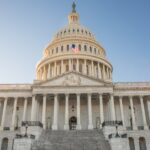
IRS Political Activity Rules Could Chill Free Speech, ASAE Says
In comments submitted to the Internal Revenue Service last week, ASAE said that proposed rules limiting political activity by 501(c)(4) organizations could have a “chilling effect” on nonprofits’ advocacy efforts.
ASAE submitted comments last week on rules proposed by the Internal Revenue Service that would restrict the amount and type of political activity that 501(c)(4) groups can engage in without jeopardizing their “social welfare” tax status.
Instead of providing a bright-line test for what constitutes political intervention, the expanded definition of ‘candidate-related political activity’ in the proposed rulemaking would regulate far more speech or advocacy than is warranted and could create a chilling effect on the role nonprofit organizations play in fostering civic engagement and democracy.
The proposed rules would redefine “candidate-related political activity” by 501(c)(4) groups to include activities such as candidate forums or meet-and-greets, get-out-the-vote efforts, and voter education. The IRS has also asked for comments on whether the new rules should be applied to 501(c)(5) labor groups and 501(c)(6) trade and professional associations as well. The proposed rules have already generated a record number of public comments—more than 25,000 so far – with thousands more likely to be filed before this Thursday’s deadline.
In its comments, ASAE said that creating a new definition of “political activity” that includes candidate forums and issue-related communications sent out close to elections would inhibit the free speech rights of these types of organizations.
“Instead of providing a bright-line test for what constitutes political intervention, the expanded definition of ‘candidate-related political activity’ in the proposed rulemaking would regulate far more speech or advocacy than is warranted and could create a chilling effect on the role nonprofit organizations play in fostering civic engagement and democracy,” ASAE said.
Given the challenge of fairly enforcing limits on political activity and the need for the IRS to be perceived as nonpolitical, ASAE suggested that the IRS could instead choose to rely on a determination of “excessive” political activity from the Federal Election Commission.
“That would remove the IRS from facing any allegations or perceptions of political bias and enable it to focus its resources on revenue collection,” ASAE said.
The House Ways and Means Committee approved a bill earlier this month to block the IRS from finalizing its rules for one year. Committee Chairman Dave Camp (R-MI) said the proposed rules, issued by the Treasury Department and IRS last November, are “a blatant attempt to legalize and institutionalize targeting by the IRS.” A companion bill was introduced earlier this month in the Senate by Sens. Jeff Flake (R-AZ) and Pat Roberts (R-KS).
In testimony before the House Ways and Means Oversight Subcommittee on February 5, IRS Commissioner John Koskinen cited a need for clear regulation in this area, “not only because it will help guide the IRS in proper enforcement, but will also give a better roadmap to applicants and help those that already have section 501(c)(4) status understand the applicable standards and properly administer their organizations.”
(iStock/Thinkstock)






Comments